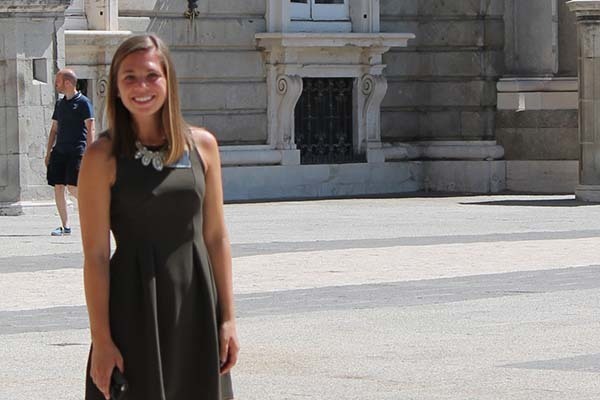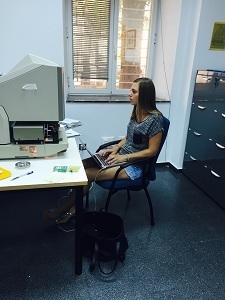
How does the experience of conducting independent research benefit undergraduate students? They gather information for senior theses and capstone projects, of course. Just as importantly, though, they get the time that they need to learn how to conduct independent research. This was the experience of Grace Maginn ('16), a history major and recipient of the Summer Travel and Research Grant. She traveled to Madrid to research El Ejército de África (the "Army of Africa") and the Spanish Civil War. Grace recently wrote to us about her complete cultural and academic experience:
When I leave this university in the spring, I will be able to say with certainty that one of the most formative and memorable experiences I’ve had here at Notre Dame was the summer I spent in Madrid. The research I did not only gave me resources to be able to write my senior thesis, but it also gave me cultural and linguistic wisdom - I was pulled outside my comfort zone and bombarded with new experiences. This newfound knowledge has truly changed the way I view the world, and has helped guide me towards a few new potential postgraduate opportunities.
When I arrived in Madrid, I was initially a bit shocked by how “non-Spanish” my neighborhood was. My flat was located right near the main plaza, in a largely immigrant neighborhood. There were people from the Middle East, Africa, Taiwan, India, and other places. Many “hipsters” lived in my neighborhood as well, which meant I had to look long and hard to find someone without a strange tattoo or piercing. The eclectic Lavapiés neighborhood became my home by the end of the summer in the ways that it stretched me to go outside my comfort zone. Around 7 p.m. on weeknights, Senegalese men would parade through the streets, singing and playing drums. Kids would be up at all hours of the night, finishing dinner around 11, and then playing in the parks until 1 or 2 in the morning. Most people would sit outside their shops during the day, chatting with their neighbors across the street. By 2 p.m., the streets were empty - everyone had gone inside to take their siesta! I was exposed to different life practices and different kinds of people. My experience in Madrid has excited me for the diverse world I hope to encounter after graduation.
When I initially began my archival research, I was a bit intimidated by the stuffy and strict archivists I consulted with. They never seemed very enthusiastic to help the blonde American girl who was so interested in such a small and obscure war. I was usually the only woman who worked in the military archives, and often the only person under 40. However, I befriended an archivist in the military archive. He spoke little English, but was just as interested in my topic as I. Although I never spoke much with him, I was able to practice my Spanish all the same, as he went out of his way to provide me with the necessary sources I needed to continue researching my topic. I was constantly reading telegrams, letters, maps and other texts. I thought, read, wrote and even dreamed in Spanish. My immersion into the language through my reading of these documents inevitably continued to improve my Spanish throughout the summer. I learned the language through other modes as well. I went out of my way to meet new people, and form new friendships. I didn’t simply learn military jargon in my eight weeks in Madrid, I also learned conversational, everyday Spanish. My comfort with the language grew each day, as I learned new phrases, words, and ways of expressing myself.

The abundant time I spent at the archives and the national library sifting through pages and pages of text helped me to narrow my topic down considerably. The eight weeks I had in Madrid was the perfect amount of time - to get frustrated, to change courses, to think things over, and to finally spend solid time honing in on my topic, and collecting relevant documents to analyze. I learned both the right and wrong ways to do research - how to go about sifting through antiquated cataloging systems, microfilm and original copies of texts. It was the right amount of time I needed to make mistakes, fix those mistakes and then finally settle on a clear-cut and concise topic. Without having so much raw time - to brainstorm, to process and to synthesize - I may not have accomplished as much as I did.
Above all, my experience in Madrid taught me how to be independent and self-sufficient. It taught me how to live in the real world - to live in a strange place, make new friends, discover the hidden gems of the city. My experience in Madrid truly prepared me for my life after college. It readied me for the drastic changes I will be going through once I move to a new place after graduation, and gave me the right tools to know how to deal with these changes.
My experience in Madrid was truly unforgettable. The grant I received through the Nanovic Institute allowed my research interests to thrive, and gave me the confidence, joy and excitement to begin to write my thesis. I am excited to begin this new adventure. I am sure that with the help of my research during my time in Madrid, the final finished thesis will be something to be truly proud of.